Podcast
Questions and Answers
Qual es le correcte ordine de operationes in arithmetic?
Qual es le correcte ordine de operationes in arithmetic?
- Multiplication, Division, Addition, Subtraction
- Parentheses, Exponents, Addition, Multiplication
- Parentheses, Exponents, Multiplication and Division, Addition and Subtraction (correct)
- Addition, Subtraction, Multiplication, Division
Que representa le 'domain' de un function?
Que representa le 'domain' de un function?
- Le conjunto de valores que le function pote rexer (correct)
- Le consistencia del function in algebra
- Le maximum valore que le function pote alcanzar
- Le conjunto de valores que le function produce
Qual es le formula pro calcular le area de un triangulo?
Qual es le formula pro calcular le area de un triangulo?
- $\frac{1}{2} \times Base \times Altitude$ (correct)
- Base + Altitude
- Base * Altitude * 2
- Base * Altitude
Qual es le valor de $tan(45°)$?
Qual es le valor de $tan(45°)$?
Que describe un limite in calculo?
Que describe un limite in calculo?
Qual es le media de le valores $3, 5, 7, 9$?
Qual es le media de le valores $3, 5, 7, 9$?
Qual es le correct definition de un 'evento independentes' in probabilitate?
Qual es le correct definition de un 'evento independentes' in probabilitate?
Que es un 'permutation'?
Que es un 'permutation'?
Flashcards are hidden until you start studying
Study Notes
Key Areas of Mathematics
-
Arithmetic
- Basic operations: addition, subtraction, multiplication, division
- Properties: commutative, associative, distributive
- Order of operations: PEMDAS (Parentheses, Exponents, Multiplication and Division, Addition and Subtraction)
-
Algebra
- Variables and expressions: understanding symbols and their meanings
- Equations: solving linear and quadratic equations
- Functions: concept of a function, domain, range, and notation
-
Geometry
- Basic shapes: triangles, quadrilaterals, circles, polygons
- Properties: angles, perimeter, area, volume
- Theorems: Pythagorean theorem, properties of parallel and perpendicular lines
-
Trigonometry
- Functions: sine, cosine, tangent, and their reciprocals (cosecant, secant, cotangent)
- Unit circle: understanding angles in degrees and radians
- Applications: solving triangles, understanding periodic phenomena
-
Calculus
- Limits: understanding approaches to a value
- Derivatives: rate of change, slope of a curve
- Integrals: area under a curve, accumulation of quantities
-
Statistics
- Descriptive statistics: mean, median, mode, range
- Inferential statistics: hypothesis testing, confidence intervals, p-values
- Probability: basic concepts, independent and dependent events, probability distributions
-
Discrete Mathematics
- Set theory: unions, intersections, subsets
- Graph theory: vertices, edges, paths and circuits
- Combinatorics: permutations and combinations, binomial theorem
Important Concepts
- Number Systems: Natural numbers, integers, rational numbers, real numbers, complex numbers
- Mathematical Proofs: Induction, contradiction, direct proof
- Mathematical Reasoning: Deductive vs inductive reasoning
- Patterns and Sequences: Arithmetic and geometric sequences, Fibonacci sequence
Applications of Mathematics
- Real-world problem solving: budgeting, measurements, engineering design
- Data analysis: interpreting graphs and charts, statistical modeling
- Computer science: algorithms, computational complexity, cryptography
Study Tips
- Practice regularly: Consistency enhances understanding
- Use visual aids: Diagrams and graphs can clarify complex concepts
- Solve past papers: Familiarizes you with exam formats and question types
- Collaborate with peers: Discussing topics can deepen comprehension
Key Areas of Mathematics
-
Arithmetic
- Operaciones basic: addition, subtraction, multiplication, division.
- Propriedades essential: commutative, associative, distributive.
- Ordine de operationes: PEMDAS (Parentheses, Exponents, Multiplication and Division, Addition and Subtraction).
-
Algebra
- Comprension de variables e expressiones: interpretação de symboles e lor significato.
- Equations: solution de equations lineares e quadratica.
- Functiones: conceito de function, dominio, intervallo, e notation.
-
Geometry
- Formas basic: triangles, quadrilaterals, circles, polygons.
- Propriedades: angles, perimeter, area, volume.
- Theoremas: teorema de Pythagoras, proprieties de lineas parallel e perpendicular.
-
Trigonometry
- Functiones: sine, cosine, tangent e lor reciprocos (cosecant, secant, cotangent).
- Circulo unitario: comprension de angles in grados e radians.
- Applications: solution de triangles, comprension de phenomena periodic.
-
Calculus
- Limites: comprehensio de approaches ad un valor.
- Derivadas: taxa de cambio, inclinatio de un curva.
- Integrales: area sub un curva, accumulation de quantitates.
-
Statistics
- Statisticas descriptivas: mean, median, mode, range.
- Statisticas inferential: testing de hypotheses, intervallo de confidence, p-values.
- Probabilitate: conceptos basic, eventos independent e dependent, distribuciones de probabilitate.
-
Discrete Mathematics
- Theorie de conjuntos: unions, intersections, subsets.
- Theorie de grafos: vertices, edges, paths e circuits.
- Combinatoria: permutations e combinations, teorema binomial.
Important Concepts
- Systemas Numericos: Numeros natural, integers, rationales, real, e complex.
- Provas Mathematica: Induction, contradiction, direct proof.
- Rasonamento Mathematica: Rasonamento deductive vs inductive.
- Patrones e Sequencias: Sequencias arithmeticas e geometricas, sequencia de Fibonacci.
Applications of Mathematics
- Solution de Problemas Reales: Budgeting, measurements, design de engineering.
- Analisis de Data: Interpreting de graphs e charts, modeling statistico.
- Informatica: Algorithms, complexitate computationale, cryptografia.
Study Tips
- Practice regular: Consistentia enhance comprension.
- Usa aids visual: Diagrams e graphs pote clarificar conceptos complex.
- Solve past papers: Familiarisation con formatos de examen e tipos de question.
- Collaborar con pares: Discussar topics pote profundar comprehension.
Studying That Suits You
Use AI to generate personalized quizzes and flashcards to suit your learning preferences.




